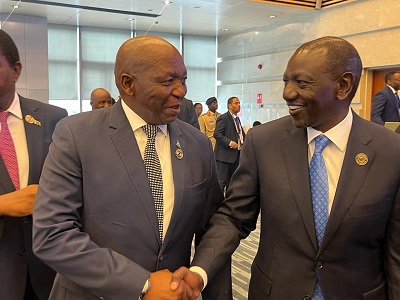By:Thandiwe Kubere
As the African continent tackles the ongoing challenges of malnutrition, affecting health, education, and economic potential, the urgency to address this issue has evidently become greater. Recent studies have highlighted a direct correlation between stunting and reduced educational achievements, pointing to a broader impact on future economic opportunities.
The African Union (AU), in partnership with the Kingdom of Lesotho, AfDB’s African Leaders for Nutrition (ALN), FAO, WFP, Big Win, and others, are actively addressing this crisis. The 2024 AU theme, “Educate an African Fit for the 21st Century,” strongly emphasizes the need to combat malnutrition to enhance education and overall human capital development, marking a paradigm shift to a comprehensive 8,000-day strategy that spans the entire childhood and adolescence.
All partners are set to participate in the Thirty-Seventh Ordinary Session of the Assembly of the African Union. This event, which took place 16 February 2024 in Addis Ababa, Ethiopia, focused on the profound impact of malnutrition on education and economic development across Africa.
The high-level round table deliberations by heads of countries was themed “Addressing Malnutrition, Catalysing Africa’s Transformation through Enhanced Education”. It brought together influential figures, including His Majesty King Letsie III of Lesotho, alongside representatives from key organisations.
On behalf of His Majesty, King Letsie III, African Union Champion for Nutrition and the FAO’s
Goodwill Ambassador for Nutrition, Right Hon. Samuel Ntsokoane Matekane declared the event was hosted during a time when approximately 86 million children under the age of five in Africa face various forms of malnutrition. Of these, 63 million suffer from stunting, 10 million struggle with being overweight, and three million experience wasting. “It is Africa’s children who bear the brunt of malnutrition’s worst consequences”, he said.
The findings of Cost of Hunger in Africa (COHA) studies have revealed that malnutrition has far-reaching implications beyond individual health; it hinders educational attainment and diminishes work productivity. Many African countries lose around 1.9% to 16.5% Gross Development Product (GDP) annually due to this issue. A healthy diet costs USD3.6 per person per day but is not affordable for many people; thus, the number of undernourished individuals in Africa is projected to increase to 51.5%. Transforming food systems must become an urgent priority.
He noted that Africa has made notable progress towards ensuring that children are well-nourished and equipped to face their futures. In 2023, 30% of children under five years were stunted, down from 35% in 2012.
However, he mentioned that fifteen countries still have high prevalence rates exceeding 30%, which accounts for forty-two out of sixty-three million stunted children on the continent. “The progress that the continent has made in reducing stunting, is too slow to help us achieve the target of a 40% reduction by 2025” he asserted.
Apart from reducing stunting levels among young kids below five years old, countries were expected to ensure there was no increase in overweight prevalence among them as well 2025.
Over the last decade, the number of overweight children has increased from 8.8 million in 2012 to 10.2 million in 2022. Close to 25 countries in Africa are not on track to achieve the World Health Assembly (WHA) target.
Right Hon Matekane enlightened that with regard to reducing wasting, 19 AU member states are on track to reduce and maintain childhood wasting to below 5%. However, there are significant regional differences that are important to note. Some member states such as South Sudan, Sudan, Eritrea, and Somalia carry the highest burden of childhood wasting.
“Our commitment as leaders remains a pivotal pillar in driving policy and legislative actions to tackle malnutrition. Member states need to adopt stronger policies and increase financing for nutrition in order to turn the tide of malnutrition and secure the future of our children. I must commend the AUC for embarking on the development of a Strategic Framework on Prevention and management of Anemia in Africa, a Multi-sectoral Nutrition Policy Framework and a Funding Target for Nutrition Investment in Africa” he said.
It was assured that the strategic documents will guide and guarantee domestic resource allocation for nutrition programming. Nutrition leaders, including the members of the Presidential Dialogue Group, were therefore called on board to spearhead the development of multi-sectoral interventions that address malnutrition in all its forms across key sectors such as health, education, agriculture, social protection, water and sanitation.
“The AU theme of the Year with a focus on education, presents yet another unique opportunity for Member States to drive increased integration of nutrition within the education sector. I further call upon leaders to remain committed and strive for the full implementation of all political declarations on nutrition that were made in 2022 and 2023”, he said.
“Excellencies, To maintain the momentum created over the years, during the AU Year of Nutrition and the initial decade of implementing the Agenda 2063, I urge AU Member States to take advantage of forthcoming moments such as the World Health Assembly, Scaling Up Nutrition Movement Global Gathering and the Nutrition for Growth meetings that will be held later this year, to re-focus and recommit increased investments towards tackling malnutrition.
“I wish to conclude by calling on AU Member State to share lessons learnt in addressing malnutrition as a way to fast-track the achievement of the global and continental targets on nutrition by using data and evidence to inform investment decisions and ensure Member State-level accountability”, expressed Right Hon. Matekane.


